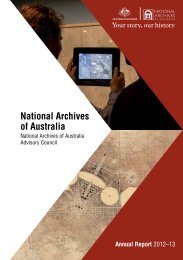National Archives of Australia - Annual reports
National Archives of Australia - Annual reports
National Archives of Australia - Annual reports
You also want an ePaper? Increase the reach of your titles
YUMPU automatically turns print PDFs into web optimized ePapers that Google loves.
Appendix C<strong>National</strong> and international strategic relationsThe <strong>Archives</strong> participates in a variety <strong>of</strong>national and international arenas. It addressescontemporary information management issuesand fosters international archives relationships.Council <strong>of</strong> Australasian<strong>Archives</strong> and RecordsAuthoritiesThe Council <strong>of</strong> Australasian <strong>Archives</strong> and RecordsAuthorities (CAARA) is the coordinating body fornational, state and territory archives in <strong>Australia</strong>and New Zealand. It meets biannually, and theDirector-General represents the <strong>Archives</strong>.CAARA considers issues such as:• the management <strong>of</strong> records following thetransfer <strong>of</strong> functions between governments,or between governments and the privatesector• principles for the disposal <strong>of</strong>, and access to,ministerial records• the ongoing review <strong>of</strong> copyright legislation• the state <strong>of</strong> archives in <strong>Australia</strong>.In 2010–11, CAARA maintained strong relationshipswith Blue Shield <strong>Australia</strong>, the <strong>Australia</strong>n Society<strong>of</strong> Archivists, and <strong>National</strong> and State LibrariesAustralasia. Its two active working groups –Australasian Digital Records Initiative and theStandards for Public Access Working Group –developed two policy statements: Guidelines forCAARA Institutions on Online Media Participation,and Online Access to Public Records. Several otherpolicy statements are currently being developed.The joint <strong>Archives</strong>/CAARA 2010 ResidentialSchool – <strong>Archives</strong> 2.0: interacting with the future– took place in November 2010 in Canberra. Heldevery two years, the Residential School is a keypr<strong>of</strong>essional development activity on the CAARAcalendar, and is designed to provide delegatesthe opportunity to address in detail a relevantcontemporary issue facing archivists. Over thecourse <strong>of</strong> the 2010 Residential School, delegatesheard from a diverse range <strong>of</strong> speakers includingformer <strong>National</strong> <strong>Archives</strong> <strong>of</strong> <strong>Australia</strong> AdvisoryCouncil member Senator Kate Lundy, economistNicholas Gruen, and digital curators SebastianChan and Tim Sheratt. Delegates discussedhow archives could embrace the opportunities<strong>of</strong>fered by Web 2.0 technologies to add valueto their services and engage more closely withtheir audience.CAARA contributions to <strong>Australia</strong>n Governmentprojects in 2010–11 included reviewing theProtection <strong>of</strong> Movable Cultural Heritage Act 1986and Protection <strong>of</strong> Movable Cultural HeritageRegulations 1987. These reviews were conductedin consultation with the <strong>National</strong> Cultural HeritageCommittee and the broader community.Pr<strong>of</strong>essional organisations<strong>Australia</strong>n Society <strong>of</strong> ArchivistsThe <strong>Australia</strong>n Society <strong>of</strong> Archivists is the peakpr<strong>of</strong>essional body for archivists in <strong>Australia</strong>. Itunderwent a number <strong>of</strong> changes in 2010–11.A national <strong>of</strong>fice was established in Brisbane,and an executive <strong>of</strong>ficer and other staff wereengaged to strengthen the Society’s governanceand fiscal management.In October 2010, the <strong>Australia</strong>n Society <strong>of</strong>Archivists held its national conference inMelbourne, entitled Future Pro<strong>of</strong>: resilient archives2020 and beyond. A number <strong>of</strong> <strong>Archives</strong> staffmembers presented papers at the conference:Anne Lyons, Assistant Director-General, Accessand Communication, Zoë D’Arcy, Director,Communications and Programs, Julie Faulkner,Director, Digital and Online Access, and JamesDoig, Assistant Director, <strong>National</strong> PreservationCoordination. Adrian Cunningham, Director,Strategic Relations and Personal Records,participated on the <strong>Archives</strong> 2.0 panel.Appendixes 113



